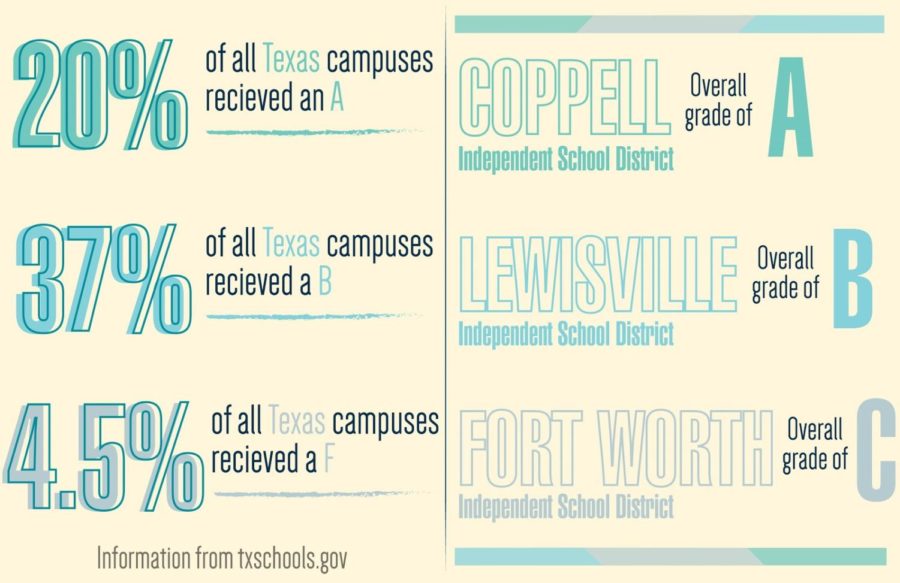CISD scores an “A” from TEA in annual grading system report
The Texas Education Agency has released “A-F Grades” for all Texas schools on Aug. 15. Coppell High School has an overall grade of an A. Graphic by Shriya Vanparia.
August 23, 2019
On Aug. 15, the Texas Education Agency (TEA) announced its “A-F grades” for all Texas school districts and Texas schools. Coppell ISD received an “A” overall while all Coppell schools either received an “A” or “B”.
To assist the process of student growth, CISD has emphasized the expansion of internal assessments beyond statewide testing by using tools, such as the PSAT and the Northwest Evaluation Association (NWEA) Measures of Academic Progress (MAP), to measure success at national and international levels. For nearby school districts, academic performance and overall growth was similarly assessed by TEA and received a variety of grades: Lewisville ISD received an overall grade of a “B”, and Fort Worth ISD received a “C”.
“I’m honored that we all work in Coppell and that [students] go to school at Coppell, because we care about you and your academics,” Coppell High School Principal Laura Springer said. “What I’m sad about is people who are in schools where they don’t have what we have. I don’t think you should ever give a grade to a school – all you’re doing is giving grades to kids who have no choice but to live in poverty, because that’s where they were born. I am totally against ranking to be honest with you, because it’s just another way in our world to have an elitist attitude. We’re just fortunate to live in a town that has money and good schools.”
Parents have shown concern to CISD’s administration about these scores, particularly within the Coppell schools that received “B”s.
“I would ask for our parents to be cognizant of a more comprehensive approach,” CISD Superintendent Brad Hunt said. “If a parent is only basing whether or not their child is successful in school off of one test, then I think again, as a district, we are doing them a disservice by not providing them with adequate information to help them understand that there are areas we are doing well in, and areas we need to improve on.”
School district ratings can additionally play a role in property values and real estate, as homes increase in value when they are in highly rated school districts. A 2017 study by the National Association of Realtors reported that 26% of homebuyers consider the quality of schools when looking for a home. Lower ranked school districts may experience less buyer demand, decreasing property value and, consequently, the amount of taxes circling back to support its respective schools.
“Certainly parents love to see these scores, and realtors want to be able to say, ‘Hey, buy a house in this district, they’re an A,’” Hunt said. “I get the economic implications of [these scores], but again, as parents we care if a school district is good for our child, but as school employees, we want to make sure we’re taking care of our kids first.”
The district has begun implementing a community-based accountability system which aligns with the Core Values of Redefining Success, Great Teaching, Engagement and Relationships. This system will allow parents and guardians, community members and educators to identify meaningful measurements to evaluate the success points unique to CISD.
“Redefining success, that’s been a big focus; sometimes we do put a lot of pressure on our kids to be successful, and it makes you think: but at what cost?” Hunt said. “For us, it really is about developing more of a comprehensive-based assessment system; we actually have a committee that has been working on that using the Community Based Accountability System (CBAS), including elements like STAAR, SAT and other data points, but also making sure to include the variety of clubs and organizations, attendance, anti-bullying and anti-drug use, and that [students] love their teachers and principal – none of which can be assessed on a STAAR test.”
Follow Sarah @syw6338












